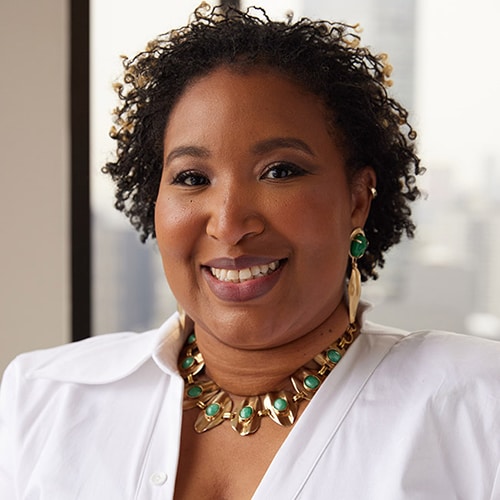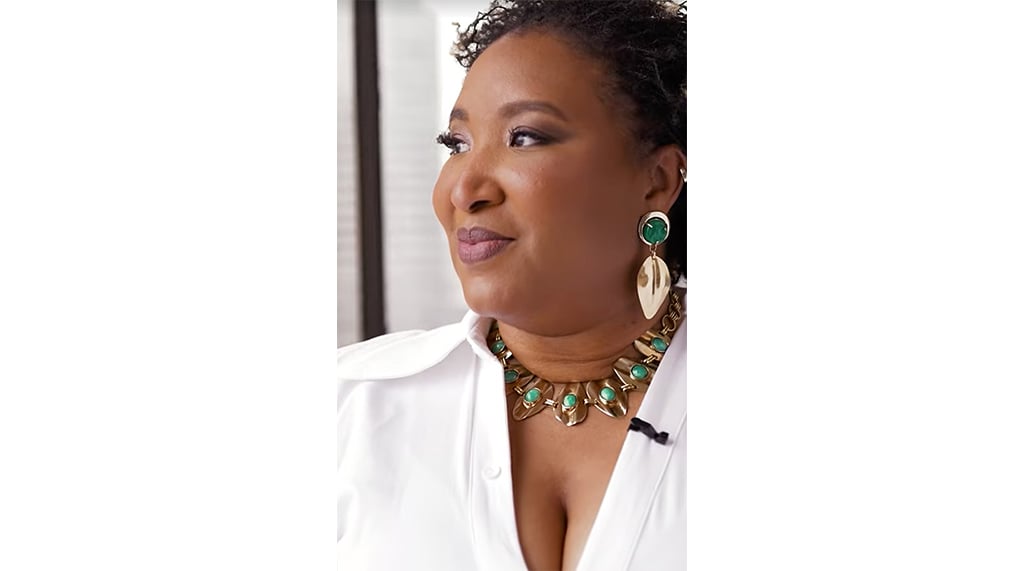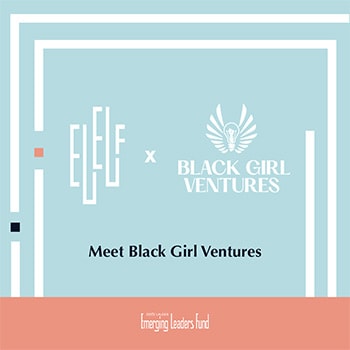
The mission of the Estée Lauder Emerging Leaders Fund is to build a new generation of leaders who redefine leadership. And Omi Bell, the founder of Black Girl Ventures (one of the Fund’s grant partners) is one of those leaders.
“When I think of Estee Lauder and Black Girl Ventures, I automatically think leadership and changemaker…We’re working together to support women as leaders. Mrs. Estee Lauder’s journey and the idea of having enough belief in yourself and seeing yourself in a certain way, is absolutely what propels yourself to the next level,” she says.
A mother of three, a serial entrepreneur, and a woman who believes in the power of community above all else, she is the definition of what it means to “lift as you climb.” The impact of her work, paying success forward, focusing on Black women, cannot be underestimated—especially when statistics show that Black women start businesses at six times the national (U.S.) average, yet receive less than one percent of venture capital.
Here, we chatted with Omi about how she got started in this incredibly important and inspirational work, and how she sees herself as a leader.

You have such an amazing back story! From computer science to teaching to entrepreneurship—how do you think each chapter of your life has contributed to where you are now?
Sometimes when people leave their jobs or they leave different efforts or things they've been a part of for a long time, they feel like they’re starting from scratch. But I often say, "You're not starting over. You're starting from here." And that comes with every bit of life experience that you've had along the way. Being a mom means you're great at thinking strategically, juggling and managing multiple things at once. When you’re a student, you develop ways of accomplishing tasks and putting new ideas together. So I think with every step of my journey, I'm always thinking about creating results.
I had my first child when I was 17 and my second child when I was 21. Creating results became inherent. I've lived a lot of lives. I was a K-12 teacher. I worked in workforce development. I worked for the Patent Trademark office. But I think it was the computer science study, which gave me the ability to think systematically, and later in my career, when I began doing performance poetry, that contributed the most.
Getting on stages and performing in front of crowds, you learn a lot about how to move people's emotions forward. How to cause a rise in positivity. When you're on stage, you're really controlling a room with the energy that you put out. Those two chapters have been key to creating systems while staying authentic, and to keeping audiences engaged in real efforts while speaking truth to power.
What led you to create Black Girl Ventures?
It was my own experience coupled with finding out that, statistically speaking, I am not alone. And building my company prior to BGV, my mom was my first investor. She gave me $10,000 of her retirement money for me to launch my print shop. I used my tax returns to buy my own machines. And so, I know the struggle of access to capital firsthand. In underrepresented communities, the majority of the capital that you use to start out is earned capital—meaning it's money coming from your actual job or from your retirement. Whereas, in some more privileged social groups and ethnic groups, they have the ability to use legacy capital from family. And so, not having that, and kind of bootstrapping it, I really had to hit the ground running to build my business.
Then the news came out that Black women were starting businesses at six times the national average, yet receiving less than 1% of venture capital. When I heard that, I'm like, "Number one, I'm not the only one. Number two, what could I do about it?" And so, through my experience as a community builder and as a businesswoman, I pulled those two things together and I created what essentially started out as a brunch, which was women coming in, pitching their businesses. I charged at the door. The attendees voted, and the winner got the capital.
I'm excited to see that what started as understanding the need personally and then understanding it statistically has now turned into a full-on game changer and a movement to really infuse access to capital, capacity, and community into the lives of Black and Brown women across the United States and beyond.
We serve over 20,000 women across the globe. We have people accessing Black Girl Ventures from over 64 countries. We have funded, directly, over 400 business owners.
What kind of leader are you? Or how would you describe yourself as a leader?
I would define my leadership as diplomatically radical. I think empathy is one thing, but if I take being diplomatically radical + empathy and kind of put them into one, I guess you would come up with this fierce mold for what it means to speak truth to power, while being sensitive to individual issues as well. Like micro and macro challenges that various communities are facing—just being able to see past the moment or see around the corner. Being highly intuitive is key.
What fuels your passion for your work?
Seeing others succeed and community. I think that in building a business, even prior to BGV, I was sort of head down and working alone. And I realized in doing so that it does not expand your network into finding more funding. I'm also energized by learning from others and being in community with others. And so seeing a success that could potentially change the world for the future, for my daughter, for other daughters around the world, is what really fuels the “why” for doing what I do.
How has your cultural background influenced your relationship to beauty?
My cultural background, being a Black woman in America, has had its challenges, especially when it comes to hair and my journey of what it means to see my hair as beautiful. It’s made me question myself and whether my natural hair was good enough. I've also had challenges over the years with body image and thinking, “Are my natural curves welcome? If there's a little extra roll of fat here and there, will I be perceived as beautiful?” But through confidence-building exercises and coaching, I feel beautiful in who I am and being how I am. I'm an authentic, empathetic leader, and that authenticity allows me to connect with my audience more. And I like to just be real about it.
There are so many ways you can put on a sort of armor when it comes to talking about beauty and being in the position of a leader. But I think feeling that beauty within is an essential part of being a confident, empathetic leader.

What does the idea of “paying it forward” mean to you as it relates to leadership?
Paying it forward means lifting while you climb. It means making sure that every step of my journey, as I'm learning, I am sharing.
If I can help somebody skip steps, or advance quicker, or advance in a way that has a positive long-term impact on their career, then I absolutely want to be giving that knowledge back.
That’s what BGV is built off of—learning and sharing. That's the power of community. One of our core values is to stay learning and keep teaching. Because it's the life lessons that are really key to growing a business. These are the things that you can't Google. You have to have a question in order to Google, and if you don't know what you don't know, where do you get it? You get it from community.
What do you want every woman impacted by Black Girl Ventures to come away feeling? And what do you hope they do with that experience?
I want every woman who experiences BGV to feel a sense of belonging. You can have a lot of associates and friends, but the spirit of belonging gives you a sense of agency and empowerment that no other feeling can. And in order for us to succeed in business, we need to feel that agency; we need to be empowered. I hope that everybody feels included and part of something bigger than them.
